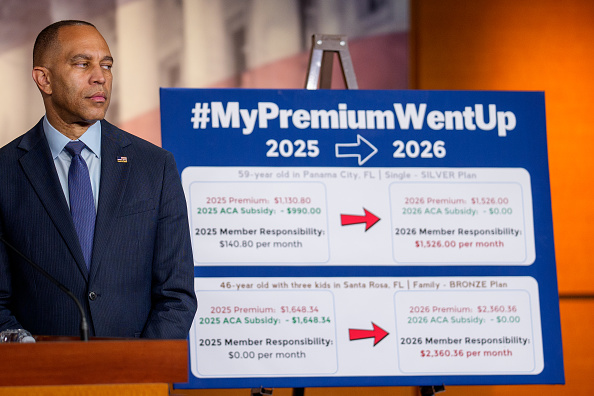The administration of President Donald Trump is stepping up efforts to increase exports of U.S. liquefied natural gas (LNG) to Europe.
Among the measures discussed during a June 25 White House meeting between Trump and European Commission President Jean-Claude Juncker to reduce trade tensions between the United States and the European Union was a preliminary agreement for Europe to buy more American LNG.
“We agreed to a strengthened and strengthening of our strategic cooperation with respect to energy,” Trump said at a joint press conference with Juncker. “The European Union wants to import more liquefied natural gas, LNG, from the United States, and they’re going to be a very big buyer. We’re going to make it much easier for them, but they’re going to be a massive buyer of LNG.”
Juncker said the EU would build more LNG import terminals. There are currently 28 large-scale LNG import terminals in Europe—24 of them in EU nations—with capacity to process 227 billion cubic meters. CNBC reports the EU is supporting 14 LNG infrastructure projects which would increase Europe’s import capacity by 15 billion cubic meters by 2021.
Europe has already increased its imports of U.S. LNG over the past two years, with Spain and Portugal leading the way. EU countries importing smaller quantities of American LNG include Britain, Italy, Lithuania, the Netherlands, and Poland, according to the U.S. Energy Information Administration.
Russian Competition
The biggest obstacle to increased sales of LNG to Europe is stiff competition from Russia. Russian-supplied natural gas has about a 35 percent share of the EU market for the product.
Gas transported to Europe through pipelines is less expensive than LNG shipped from the Unites States across the Atlantic Ocean. The current average price of U.S. gas shipped to Europe is slightly more than $7 per million British thermal units (BTUs). By contrast, gas shipped through pipelines from Russia has an average cost of between $4.50 and $5.50 per million BTUs.
‘Energy as a Geopolitical Weapon’
For Europe, however, price is not the only important factor to consider when choosing its gas supplier.
Russia has manipulated gas markets and even cut off supplies to Europe during critical winter months, in an attempt to discourage European political leaders from openly opposing Russian actions or imposing sanctions in response to Russian government policies in Syria and the annexation of territory in Georgia and Ukraine.
To undermine Russia’s geopolitical power and reduce America’s trade deficit, Sen. John Barrasso (R–WY) introduced legislation in Congress on July 18 to accelerate U.S. Department of Energy approval of LNG exports to Europe.
Barrasso’s bill would also authorize U.S. sanctions against Russian energy projects, including the planned Nord Stream 2 pipeline which would run across the Baltic Sea from northwestern Russia south to northeastern Germany.
“Russia continues to undermine peace and security in Europe through a variety of mechanisms, including the use of energy as a geopolitical weapon,” reads a summary of the bill.
“It is in the national security interest of our country to help our allies reduce their dependence on Russian energy,” Barrasso said on the Senate floor upon introducing his bill.
Barrasso’s bill also directs U.S. Permanent Representative to the North Atlantic Treaty Organization Kay Bailey Hutchinson to encourage NATO members to work with the United States to “achieve energy security for its members and partners in Europe and Eurasia.”
Big Economic Impact
Increasing LNG exports would bring large benefits to the U.S. economy.
A new analysis from LNG Allies, using U.S. Energy Information Administration data, estimates already expected LNG exports will add between $716 billion and $1.267 trillion in cumulative “direct, indirect, or induced value added” to the U.S. economy by 2050, and from 2013 to 2050, “LNG plants would support 2.0 million to 3.9 million job-years of direct, indirect, and induced labor.”
Oil and gas companies are already investing in new LNG facilities in anticipation of an increase in exports. In 2016, Houston-based Cheniere Energy opened its Sabine Pass terminal in Louisiana, which now has the capacity to process 18 million metric tons of LNG per year and is shipping LNG to at least 20 foreign markets. The company is expanding the Louisiana terminal and building a new LNG export terminal in Corpus Christi, Texas.
Reducing Russian Influence
LNG exports are good for the economy and global energy security, says James M. Taylor, a senior fellow at The Heartland Institute, which publishes Environment & Climate News.
“LNG exports to Europe will create American jobs, bring foreign money into the United States, improve our national trade deficit, diminish Russian foreign policy influence, and punish the Russian economy as least as much as trade sanctions,” Taylor said. “It is difficult to understand why many coastal Democrats at the federal, state, and municipal levels have long obstructed the construction of LNG export terminals.
“One has to wonder if they really enjoy seeing a thriving Putin economy and growing Russian influence over our European allies,” said Taylor.
Jordan McGillis, a policy analyst at the Institute for Energy Research, says increasing LNG exports will improve U.S. economic ties to the EU and reduce Russia’s influence on Europe.
“As the Kremlin continues its global agitation campaign, the U.S. and Europe have the opportunity to sow closer economic bonds through natural-gas trade,” said McGillis. “Although gas moved via pipeline from the east is cheaper than LNG shipped across the Atlantic, by expediting the LNG export-approval process, the U.S. can give European exporters a viable option to turn away from Putin and his cronies.”
Bonner R. Cohen, Ph.D. ([email protected]) is a senior fellow at the National Center for Public Policy Research.
Internet Info
Tim Benson, “Research & Commentary: Natural Gas Exports, Driven by Fracking, to Provide Long-Term Economic Benefits,” The Heartland Institute, May 11, 2018: https://heartland.org/publications-resources/publications/research–commentary-natural-gas-exports-driven-by-fracking-to-provide-long-term-economic-benefits
Official Connections
Sen. John Barrasso (R–WY): https://www.barrasso.senate.gov/public/: https://www.barrasso.senate.gov/public/index.cfm/contact-form



